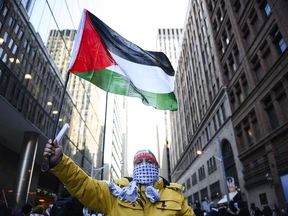Opinion: There are several reasons why the calls for a ceasefire are problematic

People take part in a demonstration in support of Palestine in Toronto on Nov. 12, 2023. PHOTO BY CHRISTOPHER KATSAROV/THE CANADIAN PRESS FILES
Last week, I wrote about three of the common myths that Israel's opponents have been promulgating about the war against Hamas. Here are a few more.
Myth #4: A ceasefire will solve the conflict
Other countries have a recognized right to defend themselves and neutralize any threat when attacked, but the calls for Israel to stand down started immediately after Oct. 7, even before Israel had launched a significant counterattack.
There are several reasons why the calls for a ceasefire are problematic, foremost being that leaving Hamas intact would allow it to regroup and remilitarize, as it has following every previous ceasefire. Does anyone really doubt that they will attempt to attack Israel again and again, as they have repeatedly said that they would? Allowing Hamas to survive and attack another day would also diminish the disincentive for other groups bent on Israel's destruction, including Hezbollah, the Houthis and Iran, from attempting to replicate the Oct. 7 massacre.
If Hamas remains in power, Gaza's future will remain uncertain. Israel will never allow a Palestinian state run by Hamas, however many countries "recognize" its existence and Hamas seems unlikely to allow any other group to run Gaza. The likelihood of a genuine political solution with Hamas at the table is minimal.
Myth #5: Hamas are not terrorists but resistance fighters
Like our national broadcaster, which refuses to call Hamas a terror group, there are many who use the terms militants or resistance fighters when describing Hamas's members. But you don't have to dig deep to see what the group believes in. The Hamas Charter itself calls for the elimination of Jews in Israel since the Jews in that region are viewed as an outrage to the Muslim Middle East. They make no secret of that goal. If you believe that they are not serious about that, look at the campaign of atrocities they committed on Oct. 7, which they filmed to motivate their troops and terrorize Israelis into leaving the country.
Myth #6: There is no proof of sexual violence on Oct. 7
Reports of sexual violence, including rape, immediately began to circulate following the Oct. 7 attacks, but many have been skeptical that such acts really took place. Even the UN, however, with its strong anti-Israeli bias, has found strong evidence of sexual violence. "With respect to hostages, the mission team found clear and convincing information that some have been subjected to various forms of conflict-related sexual violence including rape and sexualized torture and sexualized cruel, inhuman and degrading treatment and it also has reasonable grounds to believe that such violence may be ongoing," the UN's Special Representative on Sexual Violence in Conflict, Pramila Patten, wrote in a report in March.
The New York Times, too, documented numerous instances of sexual violence on Oct. 7 following a lengthy investigation. The Hamas terrorists themselves made no secret of it. The only ones still contesting this fact are the protesters on our streets.
Myth #7: The protests are not antisemitic because there are Jewish protesters
The protesters claim that some of their number are Jewish, but I have yet to hear of a rabbi or Jewish organization that has recognized any of the protesters as members of their synagogue or organization. I accept that there are a few Jewish protesters, likely from the radical left, but not many who have seen the inside of a synagogue in recent years. The Jewish community is, with very few exceptions, united in opposing Hamas. Regardless, the presence of some Jewish protesters doesn't excuse the antisemitism on our streets. Note the targeting of Jewish neighbourhoods, businesses and individuals and calls for Intifada and genocide against Jews in Israel. The protests have exposed the illusion that anti-Zionism is distinct from antisemitism.
The content of this article is intended to provide a general guide to the subject matter. Specialist advice should be sought about your specific circumstances.
We operate a free-to-view policy, asking only that you register in order to read all of our content. Please login or register to view the rest of this article.


